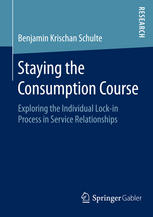

Most ebook files are in PDF format, so you can easily read them using various software such as Foxit Reader or directly on the Google Chrome browser.
Some ebook files are released by publishers in other formats such as .awz, .mobi, .epub, .fb2, etc. You may need to install specific software to read these formats on mobile/PC, such as Calibre.
Please read the tutorial at this link: https://ebookbell.com/faq
We offer FREE conversion to the popular formats you request; however, this may take some time. Therefore, right after payment, please email us, and we will try to provide the service as quickly as possible.
For some exceptional file formats or broken links (if any), please refrain from opening any disputes. Instead, email us first, and we will try to assist within a maximum of 6 hours.
EbookBell Team

0.0
0 reviewsBenjamin Krischan Schulte develops a process-model of consumer lock-in in service relationships by connecting three areas of research: path dependence, consumer behavior and service relationship marketing. He defines consumer lock-in as a situation of a potentially unaware inability to switch from or exit a consumption process due to entrenchment with increasing barriers on the individual and/or social level. Switching barriers are elaborated as consumer lock-in mechanisms. The resulting process model is outlined and empirically examined in an explorative panel study of a service relationship process in higher education. The author´s findings support the presence of consumer lock-in in services as an idiosyncratic process of gradual entrapment. The phenomenon has relevance for researchers and practitioners in complex service relationships, where lock-in was found to be a likely occurrence but difficult to grasp.